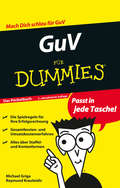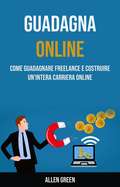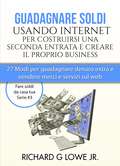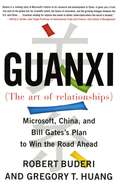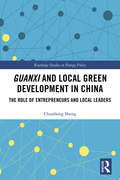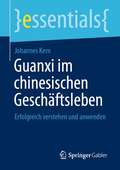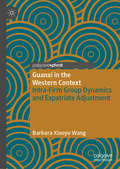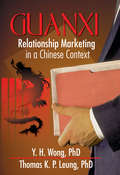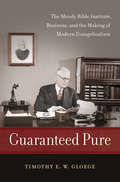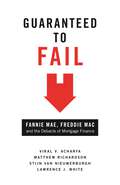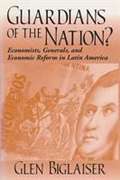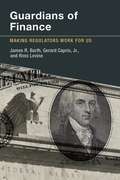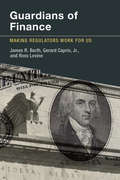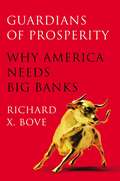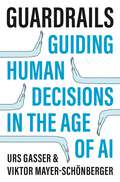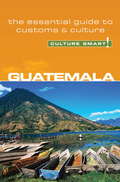- Table View
- List View
Grüne Wahrheiten: Das Buch zur Ressourcenwende
by Friedrich Schmidt-BleekEs ist das brandaktuelle Buch für die zentrale, globale Herausforderung unserer Zeit. In seinem Vermächtnis, zeigt sich Friedrich Schmidt-Bleek erneut als richtunggebender Vordenker, als Visionär, Umweltforscher und Gestalter einer zukunftsfähigen Umweltpolitik. Ein erfolgreiches Ökologiekonzept muss alle die Klimakrise auslösenden und Umwelt zerstörenden Bereiche in ihren ineinandergreifenden Wirkungszusammenhängen ganzheitlich betrachten. Darauf kann eine verantwortungsbewusste Politik mit klaren Zielen, mit richtungssicheren sozialen, ökologischen und wirtschaftlichen Indikatoren aufbauen. Der zentrale Hebel zur Bewältigung der Klimakrise und Beendigung der Umweltzerstörung besteht für den Autor in der qualitativen Veränderung der Ressourcenabhängigkeit von Produkten und Dienstleistungen durch eine wesentliche Minimierung des Ressourcenverbrauchs. Mit dem seit 1990 entwickelten MIPS Konzept (Material-Input pro Serviceeinheit) ist ein Parameter entstanden, der den Ressourcenverbrauch im Lebenszyklus von Produkten und Dienstleistungen berechenbar und damit veränderbar macht. Damit ist der Weg zu zukunftsfähigen, nachhaltigen Produkten gangbar geworden. Anschaulich und allgemeinverständlich geschrieben legt Schmidt-Bleek hier sein über Jahrzehnte verfeinertes, und vorsorgendes Ökologiekonzept dar, dass eine gesamtgesellschaftliche Transformation und Ressourcenwende ermöglicht und uns allen Wege aufzeigt, aktiv daran teilzuhaben zu können.
Grünes Wachstum: Mit „Green Growth“ gegen den Klimawandel und für die Nachhaltigkeitsziele (essentials)
by Hans-Jörg NaumerIn diesem essential lesen Sie, wie durch marktwirtschaftliche Methoden, Innovationen und Investitionen „grünes Wachstum“ erreicht werden kann, ohne dass dabei die Bedürfnisse jener drei Milliarden Menschen vergessen werden, denen es schon heute am Nötigsten fehlt. Im Kontext der Nachhaltigkeitsziele werden die Unterschiede zwischen „Green Growth“ und „Degrowth“ erläutert. In Anbetracht der Verteilungskonflikte ist Wachstum keine Frage des „Ob“, sondern des „Wie“. Die Umwelt muss dafür ein Preisschild bekommen. Der Knappheitsfaktor Umwelt ist es auch, der die Transformation zur Net-Zero-Wirtschaft ermöglichen und neue Wachstumschancen bieten wird. Gerade in einer Welt von Niedrigzinsen lenkt dies das Augenmerk auf die Chance mittels „Finance For Future“, die Welt zum Besseren zu verändern. Eine Win-Win-Win-Situation für die Umwelt, die Wirtschaft und die Anleger.Der Autor spendet das Honorar aus dem Erlös der Verkäufe an Hessen-Forst.
Grünes Wachstum: Mit „Green Growth“ gegen den Klimawandel und für die Nachhaltigkeitsziele (essentials)
by Hans-Jörg NaumerIn diesem essential lesen Sie, wie durch marktwirtschaftliche Methoden, Innovationen und Investitionen „Grünes Wachstum“ erreicht werden kann, ohne dass dabei die Bedürfnisse jener drei Milliarden Menschen vergessen werden, denen es schon heute am Nötigsten fehlt. Im Kontext der Nachhaltigkeitsziele werden die Unterschiede zwischen „Green Growth“ und „Degrowth“ erläutert, und warum mit einer „Kriegswirtschaft“ der Klimawandel nicht gestoppt werden kann. Vielmehr muss die Umwelt ein Preisschild bekommen. Durch „Finance For Future“ besteht eine Chance durch die eigene Geldanlage die Welt zum Besseren zu verändern. Eine Win-Win-Win-Situation für die Umwelt, die Anleger und die Wirtschaft. Der Autor spendet das Honorar aus dem Erlös der Verkäufe an Hessen-Forst.
GuV für Dummies (Für Dummies)
by Michael Griga Raymund KrauleidisWer einen Jahresabschluss machen muss, kommt an der GuV nicht vorbei. Die Autoren erläutern alles Wissenswerte zu den Vorgaben nach HGB, Steuergesetzen, IFRS und US-GAAP. Sie erklären die Wahl zwischen Gesamt- und Umsatzkostenverfahren und zeigen die Vor- und Nachteile beider Möglichkeiten auf.
Guadagna Online: Guadagnare con un lavoro freelance e costruirsi un’intera carriera online
by Allen GreenVuoi fare soldi online? Sei stanco di sentirti dire che è facile fare i milioni su internet? Hai voglia di conoscere una strategia realistica che funzioni per la gente normale? E se potessi costruirti davvero un business online in grado di offrire elevati margini di profitto senza alcun investimento iniziale? Ti interesserebbe? Questo libro ti insegna alcune lezioni fondamentali su come iniziare correttamente un’attività di trading di opzioni, su come evitare molti errori, sulla gestione dei rischi e su come massimizzare i profitti. Se leggerai questo libro, sarai in grado di iniziare il trading quasi subito e di guadagnarci. Il modo più facile di guadagnare un reddito extra online è svolgere questionari online nel tempo libero. Se vuoi metterti in tasca dei soldi extra alla fine del mese senza compromettere il tuo lavoro quotidiano e al tempo stesso non intendi impiegare troppo tempo su internet e non vuoi nemmeno investire denaro, allora questo è il miglior modo di guadagnare un reddito extra online.
Guadagnare soldi usando internet per costruirsi una seconda entrata e creare il proprio business
by Richard G Lowe Jr Paola GiorgioCostruisci una seconda entrata, o addirittura lavora a tempo pieno, vendendo prodotti e servizi su internet! Hai bisogno di un po’ di soldi in più? Ti piacerebbe fare qualche soldo per il futuro, pagare qualche bolletta, fare in una piccola vacanza o semplicemente dare un po’ di respiro alle tue finanze? L’idea di lavorare da casa in pigiama ti sembra la situazione ideale? Vuoi evitare un lungo tragitto per andare a lavoro o semplicemente stare più vicino alla tua famiglia? La ricerca di un lavoro è impegnativa, e se ricevere uno stipendio fisso è bello, essere un impiegato può significare rimanere bloccato a fare qualcosa che odi solo per guadagnarti da vivere. A volte ti ritrovi a fare quello che ti viene detto, anche se non sei d’accordo o non ti fa stare bene. So esattamente quello che stai attraversando. Ho fatto un lavoro a tempo pieno per 33 anni, ho sgobbato per qualcun altro, il mio sangue e il mio sudore si sono aggiunti ai loro profitti. E il risultato è stato stress, emicranie e avere a che fare con un management incompetente. Vale a dire che andava tutto male, ma ho capito che non sarei andato da nessuna parte lavorando per le grandi aziende Americane. Scopri come iniziare a vendere su eBay senza costi per giacenze di magazzino, usando una buona descrizioni dei prodotti, foto e titoli per convincere i clienti a guardare i tuoi prodotti e acquistarli. PUOI fare una discreta quantità di denaro, anche vivere bene, con le opportunità presenti su internet. So che questo è reale, perché è quello che ho fatto io. Ho colto l’occasione, ho lasciato il mio lavoro, e ho creato la mia attività redditizia lavorando su internet. In questo libro, ti darò 27 modi diversi per crearti un reddito comodamente da casa tua: Puoi vivere vendendo su eBay? I banner pubblicitari funzionano? Puoi crearti un reddito con un blog? Hai un hobby – musica, scrittura, arte – che può esse
Guano and the Opening of the Pacific World
by Gregory T. CushmanFor centuries, bird guano has played a pivotal role in the agricultural and economic development of Latin America, East Asia, and Oceania. As their populations ballooned during the Industrial Revolution, North American and European powers came to depend on this unique resource as well, helping them meet their ever-increasing farming needs. This book explores how the production and commodification of guano has shaped the modern Pacific Basin and the world's relationship to the region. Marrying traditional methods of historical analysis with a broad interdisciplinary approach, Gregory T. Cushman casts this once little-known commodity as an engine of Western industrialization, offering new insight into uniquely modern developments such as environmental consciousness and conservation movements; the ascendance of science, technology, and expertise; international relations; and world war.
Guanxi (The Art of Relationships)
by Robert Buderi Gregory T. HuangHalf a world away from the calm beauty of Puget Sound, there's a lab where Bill Gates's software dreams come true. . . . So begins Guanxi, the compelling on-the-scenes tale of the allure of China today -- and of a unique partnership between the world's most famous capitalist and the world's largest communist nation that showcases what it takes to compete in the age of global innovation. Guanxi (gwan-shee), the Chinese term for mutually beneficial relationships essential to success in the Middle Kingdom, tells the story of the juggernaut research lab that underpins Microsoft's relationship building in China. Unfurled through a gripping narrative that moves between Beijing and Microsoft headquarters in Redmond, Washington, it follows the lab's emergence as a mecca for Chinese computer-science talent -- a place where 10,000 résumés arrive in a month, written exams are farmed out to eleven cities to screen applicants, and interns sleep on cots next to their cubicles. So far, the company has invested well over $100 million and hired more than 400 of China's best and brightest to turn the outpost into an important window on the future of computing and a training ground to uplift the state of Chinese computer science -- creating dramatic payoffs for both Microsoft and its host country that are helping the company overcome many of the challenges of China. Guanxi traces the arc of the lab's stunning success from a memo by erstwhile Microsoft visionary Nathan Myhrvold to its early days under maverick speech recognition guru Kai-Fu Lee (since plucked away by Google for some $10 million), and to its more recent tutelage under former child prodigies Ya-Qin Zhang and Harry Shum. The two China-born stars, who both attended college in their native country by the age of thirteen, have orchestrated the Beijing lab's recent emergence as an epicenter of Microsoft's intensifying battles against Google in the search wars, Nokia in the wireless arena, and Sony in graphics and entertainment. As pundits rail about the "China threat" to U.S. competitiveness and offer often-hackneyed arguments against outsourcing, Guanxi explores the true ramifications of China's high-tech buildup -- and the means by which it can be turned to competitive advantage, in part by "insourcing" the untapped talent in the country's top universities. Sprinkled with telling observations, compelling characters, and lively anecdotes about the brilliant successes and sometimes painful stumbles of the world's most powerful software company, Guanxi is essential reading for business leaders, entrepreneurs, and technologists around the globe.
Guanxi and Local Green Development in China: The Role of Entrepreneurs and Local Leaders (Routledge Studies in Environmental Policy)
by Chunhong ShengThis book examines the factors which contribute to local green development in China and employs political ecology to analyze the relationship between power and the environment. Specifically, it looks at which actors control access to resources and are therefore able to promote environmental progress. Following the reform and opening-up of China in the 1970s, entrepreneurs and local officials profited economically and politically and formed close relationships, known as guanxi in China. As a result, they have also been criticized as those responsible for the associated ecological damage. This book does not contest this association, but instead argues that the current literature places too much emphasis on their negative influence and the positive influence of their environmental work has been neglected. Building on three case studies where local green development is being pursued, Shanghai Pudong New Area, Baoding, and Wuning, this book shows how local officials and entrepreneurs can also be the crusaders of a greener environment at the local level in China. This book will be of great interest to students and scholars of Chinese studies, with a particular interest in environmental policy and politics, business and society, as well as those interested in sustainable development more broadly.
Guanxi im chinesischen Geschäftsleben: Erfolgreich verstehen und anwenden (essentials)
by Johannes KernChinesische Geschäftspraktiken drehen sich um spezielle, persönliche Beziehungen, genannt Guanxi. In diesem essential wird die Frage beantwortet, was Guanxi ist, aus welchen Bausteinen das Phänomen besteht und welche Vorteile, aber auch Kosten damit verbunden sein können. Es wird diskutiert, ob Guanxi mit Korruption gleichzusetzen ist und ob Guanxi wirklich kulturell einzigartig ist. Da China seine globale Präsenz weiter ausbaut, zunehmend zum geografischen Mittelpunkt der Weltwirtschaft wird und – anders als früher vermutet – im Zuge seiner Modernisierung nicht automatisch westliche Geschäftspraktiken übernimmt, ist es gerade für Deutschland als „Chinas engem Partner in einer sich rasch wandelnden Welt“ wichtig, sich differenziert mit dem Phänomen Guanxi im Geschäftsleben auseinanderzusetzen.
Guanxi in the Western Context: Intra-Firm Group Dynamics and Expatriate Adjustment
by Barbara Xiaoyu WangDeeply rooted in Chinese culture, the concept of guanxi has been widely researched from historical, cultural and political perspectives. As Chinese multinational corporations (MNCs) expand, expatriates are increasingly carrying guanxi with them to host countries, yet little has been written on how this indigenous construct is employed in the Western world. This book takes a theoretical approach to the examination of this phenomenon and proposes a conceptual framework for the ‘guanxi capitalism structure,’ illustrating its fundamental role as the invisible hand in China. Providing empirical analysis, the author demonstrates how guanxi affects intra-firm multicultural group dynamics involving Chinese expatriates and host-country natives in Chinese MNCs. With insights for scholars researching Asian business and globalisation, and practitioners working in Chinese MNCs, this book argues that guanxi significantly alters an expatriate’s adjustment, and offers practical suggestions for cross-cultural management and the process of initiating, building, and utilising guanxi in a Western context.
Guanxi: Relationship Marketing in a Chinese Context
by Thomas Leung Erdener Kaynak Y.H. WongDevelop a network of successful business relationships in China!This systematic study of the Chinese concept of guanxi--broadly translated, ”personal relationship” or ”connections”--offers a comprehensive social and professional model for doing business in China. In addition to a clear analysis of the origins and meanings of this vital concept, Guanxi: Relationship Marketing in a Chinese Context empowers you with practical tools for establishing guanxi in order to facilitate successful business relationships. Guanxi is based on an original research study as well as the authors’twenty years of experience of doing business in China. Their understanding of the implications of face, favor, reciprocity, honor, and interconnectedness--all vital parts of guanxi--will enable you to understand the unstated assumptions of Chinese business culture. Moreover, the book discusses the legal implications of guanxi as well as cultural expectations.This valuable handbook offers a wealth of information on guanxi: case studies of guanxi in action managerial implications of saving face and reciprocity measuring guanxi quality and performance indicators step-by-step instructions for building guanxi detailed strategies for penetrating the Chinese marketGuanxi is an indispensable tool for anyone wanting to do business in China, for students of international business or Chinese culture, and for scholars interested in international business culture.
Guaranteed Pure: The Moody Bible Institute, Business, and the Making of Modern Evangelicalism
by Timothy GloegeAmerican evangelicalism has long walked hand in hand with modern consumer capitalism. Timothy Gloege shows us why, through an engaging story about God and big business at the Moody Bible Institute. Founded in Chicago by shoe-salesman-turned-revivalist Dwight Lyman Moody in 1889, the institute became a center of fundamentalism under the guidance of the innovative promoter and president of Quaker Oats, Henry Crowell. Gloege explores the framework for understanding humanity shared by these business and evangelical leaders, whose perspectives clearly differed from those underlying modern scientific theories. At the core of their "corporate evangelical" framework was a modern individualism understood primarily in terms of economic relations.Conservative evangelicalism and modern business grew symbiotically, transforming the ways that Americans worshipped, worked, and consumed. Gilded Age evangelicals initially understood themselves primarily as new "Christian workers--employees of God guided by their divine contract, the Bible. But when these ideas were put to revolutionary ends by Populists, corporate evangelicals reimagined themselves as savvy religious consumers and reformulated their beliefs. Their consumer-oriented "orthodoxy" displaced traditional creeds and undermined denominational authority, forever altering the American religious landscape. Guaranteed pure of both liberal theology and Populist excesses, this was a new form of old-time religion not simply compatible with modern consumer capitalism but uniquely dependent on it.
Guaranteed to Fail: Fannie Mae, Freddie Mac, and the Debacle of Mortgage Finance
by Lawrence J. White Viral V. Acharya Matthew Richardson Stijn van NieuwerburghWhy America's public-private mortgage giants threaten the world economy—and what to do about itThe financial collapse of Fannie Mae and Freddie Mac in 2008 led to one of the most sweeping government interventions in private financial markets in history. The bailout has already cost American taxpayers close to $150 billion, and substantially more will be needed. The U.S. economy--and by extension, the global financial system--has a lot riding on Fannie and Freddie. They cannot fail, yet that is precisely what these mortgage giants are guaranteed to do. How can we limit the damage to our economy, and avoid making the same mistakes in the future?Guaranteed to Fail explains how poorly designed government guarantees for Fannie Mae and Freddie Mac led to the debacle of mortgage finance in the United States, weighs different reform proposals, and provides sensible, practical recommendations. Despite repeated calls for tougher action, Washington has expanded the scope of its guarantees to Fannie and Freddie, fueling more and more housing and mortgages all across the economy--and putting all of us at risk. This book unravels the dizzyingly immense, highly interconnected businesses of Fannie and Freddie. It proposes a unique model of reform that emphasizes public-private partnership, one that can serve as a blueprint for better organizing and managing government-sponsored enterprises like Fannie Mae and Freddie Mac. In doing so, Guaranteed to Fail strikes a cautionary note about excessive government intervention in markets.
Guaranty Trust Bank PLC Nigeria (A)
by Lynn Sharp Paine Harold F. Hogan Jr.Fola Adeola, the CEO of Nigeria's Guaranty Trust Bank and one of its founders in 1991, is considering what should be done to maintain the bank's original vision and vitality in the face of its rapid growth and success in the marketplace. Known for its high ethical standards, the bank is planning to expand inside and outside Nigeria. Among Adeola's concerns is what to do about employees' insistence on underpaying their personal income taxes--a practice he regards as inconsistent with the bank's mission of being a role model for society. A rewritten version of an earlier case.
Guardians Of The Nation?: Economists, Generals, and Economic Reform in Latin America (Kellogg Institute Series on Democracy and Development)
by Glen BiglaiserCentral to the question of how to promote economic growth in Latin America is the role different types of regimes play in determining economic performance. Guardians of the Nation? challenges conventional wisdom regarding the expected advantages of military rule for economic growth. Glen Biglaiser explains why many military regimes in Latin America have not performed noticeably better than their democratic counterparts. <P><P>Biglaiser argues that economic policy-making under military regimes is essentially an unintended by-product of the military's strategy to retain power. Using this premise, he examines the economic performance of regimes in Argentina, Chile, and Uruguay. Biglaiser shows that the appointment of neoliberal economists occurred not because military rulers possessed inherent interest in following market-oriented policies, but because they saw the appointments as a way to solidify their power. <P><P>Biglaiser's study also depicts Pinochet's one-man rule as unique vis-a-vis the military regimes in Argentina and Uruguay. He concludes by demonstrating that his study is also applicable for understanding economic policy choice under democratic rule, and by comparing the similarities and differences between presidential and parliamentary governments.
Guardians of Finance: Making Regulators Work for Us
by James R. Barth Gerard Caprio Ross LevineThe recent financial crisis was an accident, a "perfect storm" fueled by an unforeseeable confluence of events that unfortunately combined to bring down the global financial systems. And policy makers? They did everything they could, given their limited authority. It was all a terrible, unavoidable accident. Or at least this is the story told and retold by a chorus of luminaries that includes Timothy Geithner, Henry Paulson, Robert Rubin, Ben Bernanke, and Alan Greenspan. In Guardians of Finance, economists James Barth, Gerard Caprio, and Ross Levine argue that the financial meltdown of 2007 to 2009 was no accident; it was negligent homicide. They show that senior regulatory officials around the world knew or should have known that their policies were destabilizing the global financial system, had years to process the evidence that risks were rising, had the authority to change their policies--and yet chose not to act until the crisis had fully emerged. The current system, the authors write, is simply not designed to make policy choices on behalf of the public. It is virtually impossible for the public and its elected officials to obtain informed and impartial assessment of financial regulation and to hold regulators accountable. Barth, Caprio, and Levine propose a reform to counter this systemic failure: the establishment of a "Sentinel" to provide an informed, expert, and independent assessment of financial regulation. Its sole power would be to demand information and to evaluate it from the perspective of the public--rather than that of the financial industry, the regulators, or politicians.
Guardians of Finance: Making Regulators Work for Us (The\mit Press Ser.)
by James R. Barth Gerard Caprio Ross LevineHow the unaccountable, unmonitorable, and unchecked actions of regulators precipitated the global financial crisis; and how to reform the system. The recent financial crisis was an accident, a “perfect storm” fueled by an unforeseeable confluence of events that unfortunately combined to bring down the global financial systems. Or at least this is the story told and retold by a chorus of luminaries that includes Timothy Geithner, Henry Paulson, Robert Rubin, Ben Bernanke, and Alan Greenspan. In Guardians of Finance, economists James Barth, Gerard Caprio, and Ross Levine argue that the financial meltdown of 2007 to 2009 was no accident; it was negligent homicide. They show that senior regulatory officials around the world knew or should have known that their policies were destabilizing the global financial system and yet chose not to act until the crisis had fully emerged.Barth, Caprio, and Levine propose a reform to counter this systemic failure: the establishment of a “Sentinel” to provide an informed, expert, and independent assessment of financial regulation. Its sole power would be to demand information and to evaluate it from the perspective of the public—rather than that of the financial industry, the regulators, or politicians.
Guardians of Prosperity
by Richard X. BoveSince the financial crisis, amid outrage at the likes of Citigroup and JPMorganChase and Washington’s rejiggering of the financial system, the banking industry has had one major defender: Richard X. Bove. Now he explains why big banks are the nation’s lifeline to success, and why financial disaster will ensue if we make it impossible for them to fill their role in the economy. Bove argues that big banks are necessary to ensure America’s position in global finance; to assist corporations in achieving their goals against foreign competition; and, most importantly, to defend the average household’s access to financial services. Limiting the major banks, he shows, is an attack on our future growth. Bove offers ways to improve the economy’s stability, including allowing some banks to be "too big to fail” and lessening the demand on liquidity so they won’t need to sell existing loans. His main argument, that we need to stop fighting our greatest guardians of prosperity, is sure to be controversial. .
Guardrails: Guiding Human Decisions in the Age of AI
by Viktor Mayer-Schönberger Urs GasserHow society can shape individual actions in times of uncertaintyWhen we make decisions, our thinking is informed by societal norms, &“guardrails&” that guide our decisions, like the laws and rules that govern us. But what are good guardrails in today&’s world of overwhelming information flows and increasingly powerful technologies, such as artificial intelligence? Based on the latest insights from the cognitive sciences, economics, and public policy, Guardrails offers a novel approach to shaping decisions by embracing human agency in its social context.In this visionary book, Urs Gasser and Viktor Mayer-Schönberger show how the quick embrace of technological solutions can lead to results we don&’t always want, and they explain how society itself can provide guardrails more suited to the digital age, ones that empower individual choice while accounting for the social good, encourage flexibility in the face of changing circumstances, and ultimately help us to make better decisions as we tackle the most daunting problems of our times, such as global injustice and climate change.Whether we change jobs, buy a house, or quit smoking, thousands of decisions large and small shape our daily lives. Decisions drive our economies, seal the fate of democracies, create war or peace, and affect the well-being of our planet. Guardrails challenges the notion that technology should step in where our own decision making fails, laying out a surprisingly human-centered set of principles that can create new spaces for better decisions and a more innovative and prosperous society.
Guatemala - Culture Smart!
by Lisa VaughnCulture Smart! provides essential information on attitudes, beliefs and behavior in different countries, ensuring that you arrive at your destination aware of basic manners, common courtesies, and sensitive issues. These concise guides tell you what to expect, how to behave, and how to establish a rapport with your hosts. This inside knowledge will enable you to steer clear of embarrassing gaffes and mistakes, feel confident in unfamiliar situations, and develop trust, friendships, and successful business relationships.Culture Smart! offers illuminating insights into the culture and society of a particular country. It will help you to turn your visit-whether on business or for pleasure-into a memorable and enriching experience. Contents include* customs, values, and traditions* historical, religious, and political background* life at home* leisure, social, and cultural life* eating and drinking* do's, don'ts, and taboos* business practices* communication, spoken and unspoken"Culture Smart has come to the rescue of hapless travellers." Sunday Times Travel"... the perfect introduction to the weird, wonderful and downright odd quirks and customs of various countries." Global Travel"...full of fascinating-as well as common-sense-tips to help you avoid embarrassing faux pas." Observer"...as useful as they are entertaining." Easyjet Magazine"...offer glimpses into the psyche of a faraway world." New York Times
Gucci Group N.V. (A)
by David B. Yoffie Mary KwakExamines the turnaround of Gucci and its transition from a single brand to a multi-brand company. A rewritten version of an earlier case.
Gucci Group in 2009
by David B. Yoffie Renee KimThe Gucci Group had transformed itself into the world's third largest luxury retailer with multiple brands. The company had performed well even after the departure of star designer Tom Ford and former CEO Domenico De Sole. However, the challenging global economic times in 2009 raised the question whether it was time, again, to re-adjust Gucci's portfolio, especially as YSL continued to lose money.



